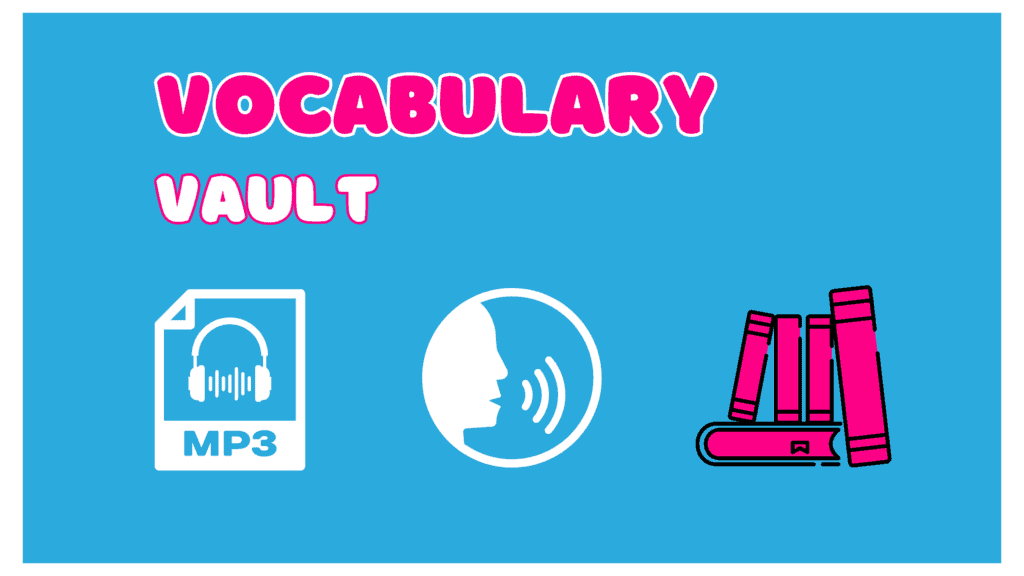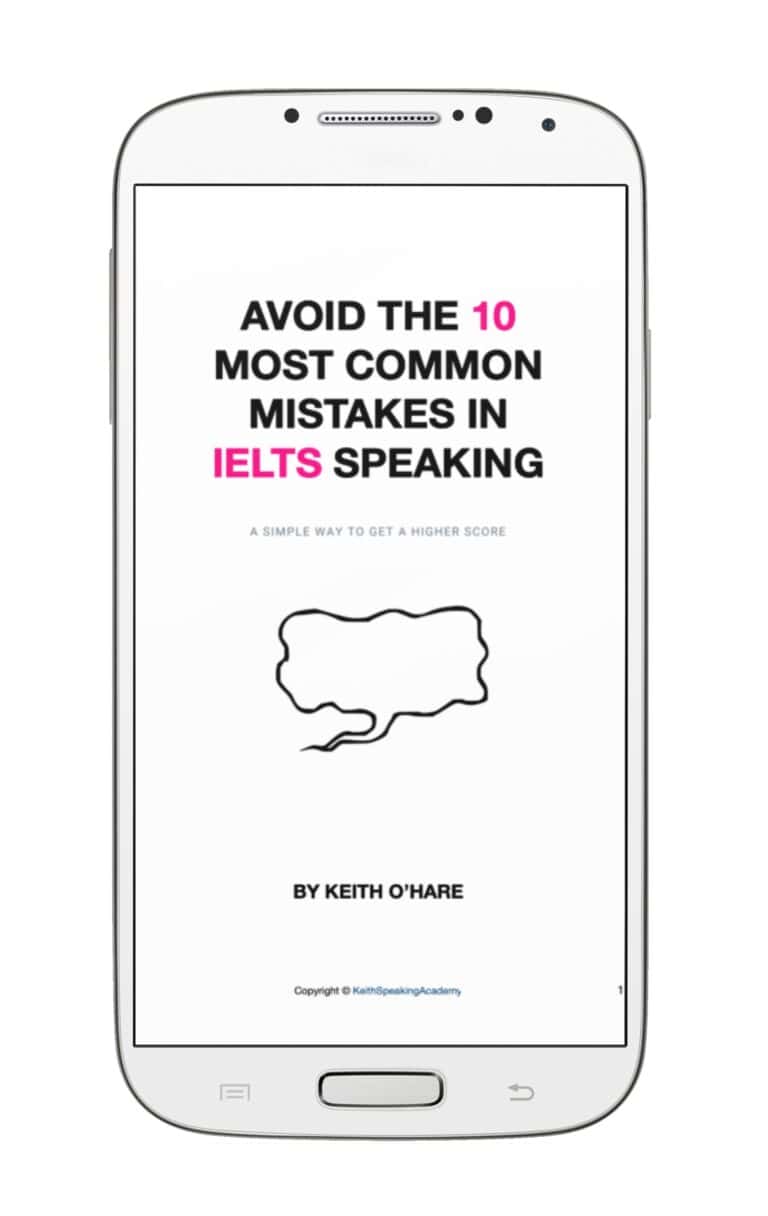IELTS Speaking Lesson about Education
👇 Take this lesson with you! 👇
Table of Contents
IELTS Speaking vocabulary: Education
Warm up!
Fill in the gap with one word
- Next week I am going to _____ the IELTS test.
- At school you will get into trouble if you don’t _________ the rules
See answers
- Next week I am going to take / sit / re-sit / re-take / pass the IELTS test.
The examiner gives the test
Cambridge English write the test
- To pass = to succeed
2. At school you will get into trouble if you don’t _follow / obey / respect / stick to / keep to / abide by the rules
IELTS Speaking: Schools
Curriculum (n.)
Curricula (n.) Plural = subjects / lessons in a course
- What do we call classes we do after school?
Extra curricular activities
After school activities
Tests and Exams
- I am going to _______ the IELTS test
- sit / take
- pass = succeed
- fail = not to pass
- re-sit / re-take / re-do = do / take again
- To pass with flying colours = to pass with a really high score
- To pass with merit = to pass very well
- To pass with (a) distinction = to pass at the highest level
- To flunk a test = to fail a test
- I sailed through the test = it was easy
- It was a breeze = it was really easy
Discipline (v.) (n.) = control, order, authority
- Our form teacher would keep us in line = keep control over us
- She was a no-nonsense teacher =doesn’t accept silly behaviour
- Strict (adj.) = keeps strong control
The opposite of strict is ______ ?
- Easy-going
- Liberal
- Indulgent
- Relaxed
- Kind
- Flexible
- Lax
- Lenient
- Laid-back
“Rules are there to be broken!”

_____ the rules
- Follow _____
- Obey _____
- Stick to _____
- Keep to _____
- Break _____
Punishment
- Detention = when you stay behind after class
- Writing lines = writing the same line 100 times
- Suspension = when you cannot go to school for a few days
- Expulsion = when you are kicked out of the school or to expelled from school
- Corporal punishment = hitting the student (caning, giving the slipper, slapping with a ruler)
Teachers
Adjectives
- knowledgeable
- well-read = s.o. who reads a lot
- strict
- tough but fair
- easy-going = relaxed
- nurturing = encouraging
- ill-prepared = badly prepared
- rambling = talking too much without a goal
- inept = not competent, not good
All of the following can be used to describe a teacher who treats some students well and others badly.
- unfair
- discriminating
- biased
- guilty of favouritism
IELTS Speaking: Learning
This is a pyramid of learning levels.
The bottom level is the lowest level of learning, and the top one is the highest level of learning.
To learn deeply, you need to try and do activities that will move you up the levels.
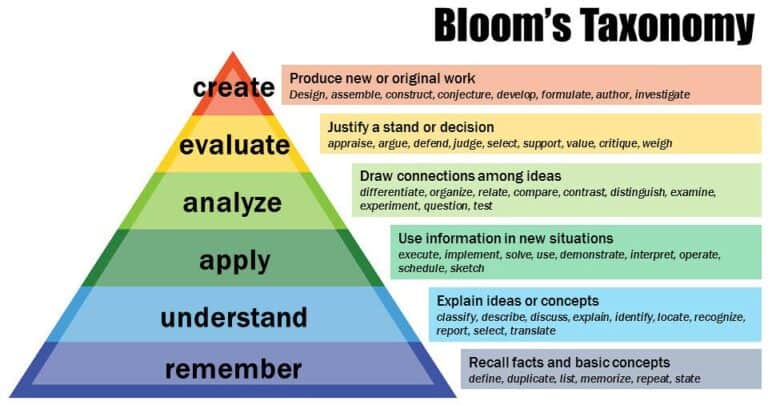
If you are a teacher, find out more about how to use Bloom’s Taxonomy here
The table below shows you the kind of activities you can do to move up the learning levels.
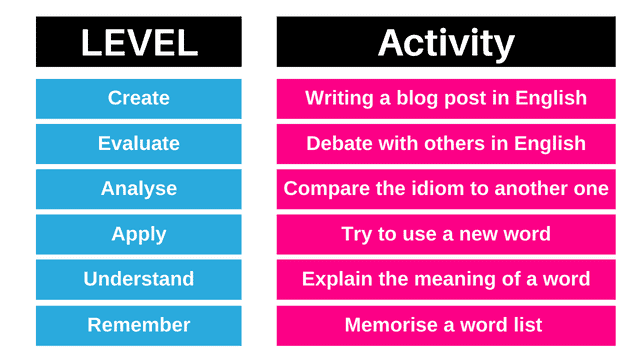
The table below shows you some useful phrases you can use to talk about learning in your IELTS Speaking test.
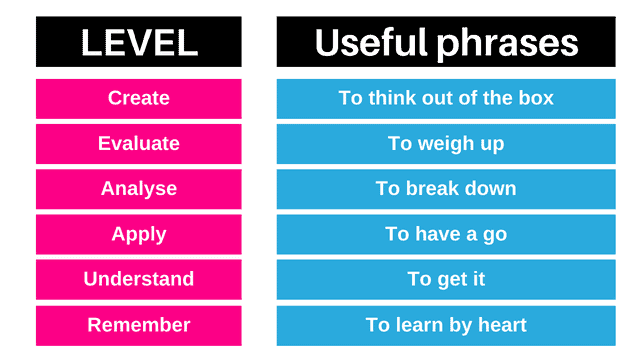
IELTS Speaking: Listening task
IELTS Speaking: Listening Task
At school, I had a teacher who just used to make us [1] _______ everything by heart. I didn’t enjoy it that much, but sometimes we had to have a [2] ____ at using those ideas in a [3] ________, and I felt that was much more beneficial. You know, [4] _________ up other people’s ideas, and thinking out of the [5] ________, I found that really useful.
See answers
At school I had a teacher who just used to make us [1] learn everything by heart. I didn’t enjoy it that much, but sometimes we had to have a [2] go at using those ideas in a [3] debate, and I felt that was much more beneficial. You know, [4] weighing up other people’s ideas, and thinking out of the [5] box, I found that really useful.
What is the impact of technology on education?
Here are some ideas phrases you can use to talk about this.
Good or Positive Impact
- We have more access to resources and information worldwide
- Technology can create shortcuts (=a way to do things more quickly)
- Learn more quickly
- It has led to personalised learning
- Motivate young people in particular
- Unleash our creativity
Bad or Negative Impact
- It can put older people off
- It can be frustrating
- It can fail
- It can be distracting
To put someone off something = to discourage someone from doing it
With this question you can also consider the impact on different groups of people.
- Old People
It can be off-putting
It can make learning daunting or overwhelming
- Kids
Make it fun
They are digital natives, so it’s easy to use
- Teachers
There’s pressure to keep up with the latest changes
There’s a steep learning curve

Free IELTS Speaking Course!

Pronunciation Files For Vocabulary From My Best Live Lessons
Use Words EASILY in English Conversations!
More Free Lessons
If you liked this lesson, leave a comment below!
There are more lessons you can follow in the links below too.
DAILY ROUTINES in IELTS Speaking. Vocabulary and idioms you need to describe about your daily routines.
ENVIRONMENT in IELTS Speaking Learn different ways to protect our environment and discuss it with idioms and vocabulary in this lesson.
MEDICINE in IELTS Speaking Learn the COVID Vocabulary for IELTS Speaking and talk about Alternative Medicines using idioms and vocabulary.
SKILLS in IELTS Speaking Learn the collocations and adjectives to talk about skills we learn and need.

